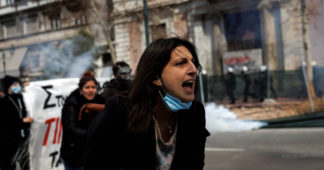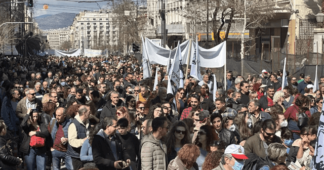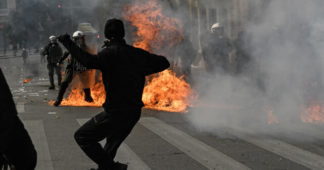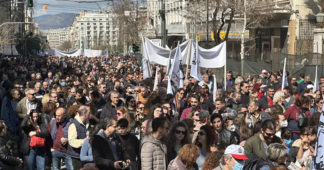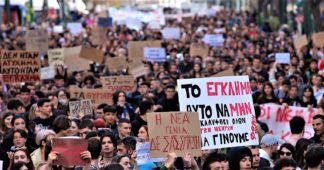EIR Volume 50, Number 12, March 24, 2023
Deadly Train Crash in Greece
Sparks Public Uprising
by Dean Andromidas
March 16—The flip side of the policy responsible for threatening the world with nuclear war, is the neo-liberal radical free market policy now hegemonic in the West, inclulding the European Union. At its head is the privatization of public services, a policy that kills as heartlessly as war.
This policy tragically played out on Greece’s main railway line between Athens and the northern city of Thessaloniki on Feb. 28 when a passenger train traveling at 160 kilometers an hour (100 mph) crashed into an oncoming freight train. At least 57 people died, many of them students returning to universities in Thessaloniki. Within hours, the vast majority of the population came to the conclusion that this was no accident, but the moral equivalent of premediated murder as a result of the neo-liberal policies of the government’s privatization and austerity. It is now known in Greece as “the crime of Tempi,” the city near which the crash occurred.
The Privatization Prime Minister
The nation is directing its anger at the government of Prime Minister Kyriakos Mitsotakis and his right-wing New Democracy Party. A full member of the NATO war party, Mitsotakis has used his mandate to turn Greece into an anti-Russian beachhead in the Eastern Mediterranean, complete with the U.S. Souda Bay Naval Base and a shipping logistics base in Alexandroupolis, which now serve the transport of munitions and weapons to Ukraine. While implementing deadly economic austerity policies, Mitsotakis has signed contracts for billions of euros in military equipment that even Greek military sources say is not necessary.
As a true believer in neo-liberal economic policies, as early as 2005 during his first term as a member of the Hellenic Parliament, Mitsotakis served as a champion for privatizing the Greek railways and other government services. In the midst of universal outrage at the government, he is, even now, trying to push through legislation for the privatization of water companies.
The crash catalyzed the pent-up rage in the population following ten years of brutal austerity, into a mass strike ferment throughout Greek society. On March 8, the main streets and squares of cities throughout the country were transformed into “rivers” of protesters as tens of thousands of trade unionists, students, pensioners, social organizations and the general public staged demonstrations throughout Greece demanding justice from a government they are convinced bears full responsibility for the deaths of their fellow citizens. The organizers of the demonstration in Athens reported 100,000 participants. In Thessaloniki, Greece’s second largest city, 20,000. Tens of thousands rallied in Patras and Larrissa, Chania in Crete, on the islands of Rhodes and Corfu, and in other cities, marching with banners denouncing the government.
The mass action is being spearheaded by the railway workers’ unions—which have been on strike since the crash—the ADEDY public sector workers’ union federation, and the GSEE union federation.
Anger is not only being directed at the incompetence of the current government, but at the entire neo-liberal economic policy, especially privatization of transportation, the healthcare sector, and other public services. Addressing the March 8 demonstration in Athens, Christos Grivas, president of ADEDY for the Athens Prefectural Department, declared: “The accident in Tempi revealed the truth of the bureaucratic state that functions as an administrator of powerful financial interests.”
Thanasis Oikonomou, a member of the Board of the OASA Workers’ Union called the crime of Tempi “premeditated,” recalling “the understaffing and staff reductions, the implementation of the entire range of anti-labor laws.” Christina Skaloumpaka, president of the Greek Women’s Federation, declared:
“We are determined not to be silent, to fight not only so that this crime is not forgotten, but also to expose the culprits: the business groups, such as the Italian corporate owner of the railway, and all the governments that support the policy.”
In other words, all the “drivers” of the policy to “liberalize transport,” just to name a few, are responsible.
‘Tragedy, Never Again’
The railway unions convened and the ADEDY and GSEE labor federations supported yet another nationwide general strike on March 16, demanding justice for the victims of the “Crime of Tempi.” Railways, ferries, and airports shut down. Schools closed, as both students and teachers also supported the strike. Tens of thousands of demonstrators gathered in Syntagma Square in front of the Hellenic Parliament in central Athens. Again, large demonstrations took place in Thessaloniki, Patras, Chania, and many other cities across the country.
The slogans on banners included this appeal to the general welfare of all Greeks:
“Together with society, we demand mass transportation that is worthy of the passenger, that is worthy of the worker, because transportation is a social good in the service of the citizen.”
Among the chants was, “Tragedy, never again!” The many other demands included free health care for all, and immediate disaster defense measures against fires and floods, and especially earthquakes.
Meanwhile, in a mass trade union demonstration in Paris on March 7, the French union SUD Rail showed its support for Greece. French railway workers displayed a banner reading: “28/2/23: Railway crime in Greece. It’s not an accident. Privatization and the state kill.” The rail workers wrote in the word “Murderers” in Greek.
The current Greek government’s mandate ends in July and general elections must be held by that time. This is generating fears, both in Washington and Brussels, that the Greek political system will suffer a meltdown and bring to power a government opposed to both the NATO war and the free market policies of the western elite. The ferment will not be confined to Greece.
Systems and 93% of Employees Eliminated
The deadly crash has been blamed on the fact that the Greek railways did not even have a functioning, rudimentary signaling system, a fact known but ignored by the government, despite several reports and letters given to the relevant government ministers and railway authorities by the Greek railway unions in the preceding months.
In 2010, after spending several billion euros modernizing its railways, Greece had a functioning signaling system that would have made the crash at Tempi impossible. In 2010, the infamous Greek debt crisis—which in reality was the continuing of the 2008 crisis of the western private financial system—put Greece under the thumb of the so-called Troika of its creditors—the European Union, European Central Bank, and the International Monetary Fund.
The imposition of the Troika’s brutal austerity, economic reforms, and privatizations, along with its forcing the government to take on another €200 billion in debt, reduced the Greek economy by one–third. The Troika dictated a frontal assault on the country’s public sector, particularly on the health sector, and of course on the railways. Unemployment was driven to a third-world level of 35%.
Beginning in 2012, the public railway, TrainOSE, saw a drastic reduction of personnel as the Troika demanded that it be broken up and privatized, It was sold off in 2017. The number of employees was reduced from some 6,000 to just 800; the department responsible for maintaining the signaling system was cut from 300 technicians to just 30! The result was a total collapse of the automatic signaling and control systems through lack of maintenance and vandalism, and by 2014 these systems ceased to exist.
Even after a contract was signed in 2016 with two private companies, including France’s major railway technology producer Alstom, to install the European Train Control System (ETCS), the project was never implemented because the ETCS system is designed to be integrated with an existing automatic signaling system, which in principle did not exist. Nonetheless, the absence of a fail-safe security system did not prevent the Italian national railway company, Ferrovie dello Stato Italiane, from buying the Greek railways, knowing full well that the system was a death trap.
Dangers to Airports, Too
The danger does not end at the borders of Greece. Be warned that no one is safe in the EU. On Feb. 28, the same day as the horrendous crash in Greece, rail workers, European Parliament members, and trade unionists demonstrated in front of the EU Parliament in Brussels to stop the EU Commission from revising the privatization law of 2016. The Commission wants to block any member state from awarding rail and road service contracts to its own operators, and to make all tenders competitive. The proposed revision would also allow the unelected European Commission to make further changes without notifying the European Parliament or the European Council.
The European Transport Workers’ Federation (ETF), one of the organizers of the Brussels demonstration, posted on its website a denunciation of this proposal:
“More privatization in rail and road transport would bring poorer working conditions, less staff, more expensive tickets, and defeat the purpose of public transport, [which is] to serve the public interest and make transport accessible to all.”
ETF’s leaders, President Frank Moreels and General Secretary Livia Spera, stressed that transport workers are fed up with the current state of the transport industry, which is already too liberalized. The sector suffers from a shortage of workers, and it is becoming increasingly difficult to find people willing to work in transport. Yet, the European Commission continues to disregard the voices of the workers.
Nor does the danger end with the railways. Security and safety at Greece’s privatized airports are now being questioned. The Panhellenic Airports Association (PAA) told the Greek daily Documento:
“Unfortunately, the image of discredited and faulty implementation of safety policies on the railway is not the only one. The reality is that for years a similar, parallel, course has been followed in the field of aviation.”
PAA reported that Greek Transport Minister Costas Karamanlis, who resigned after the train crash, “abolished all Aviation Authorities in all Greek airports, that is, the organs of the state that control the application of airport security rules and national and European aviation legislation.”
This happened as soon as Greece’s airports were privatized. In their place, Karamanlis created the so-called Civil Aviation Authority (CAA) which operates out of a single office in downtown Athens. Athens International Airport and 14 others around the country were bought by the German company Fraport AG, itself owned by the German state of Hessen. Fraport owns and operates the huge Frankfurt Airport. Like many other state-owned companies, such as Deutsche Bahn, Fraport operates as a for-profit private company.
We remind our readers that publication of articles on our site does not mean that we agree with what is written. Our policy is to publish anything which we consider of interest, so as to assist our readers in forming their opinions. Sometimes we even publish articles with which we totally disagree, since we believe it is important for our readers to be informed on as wide a spectrum of views as possible.
